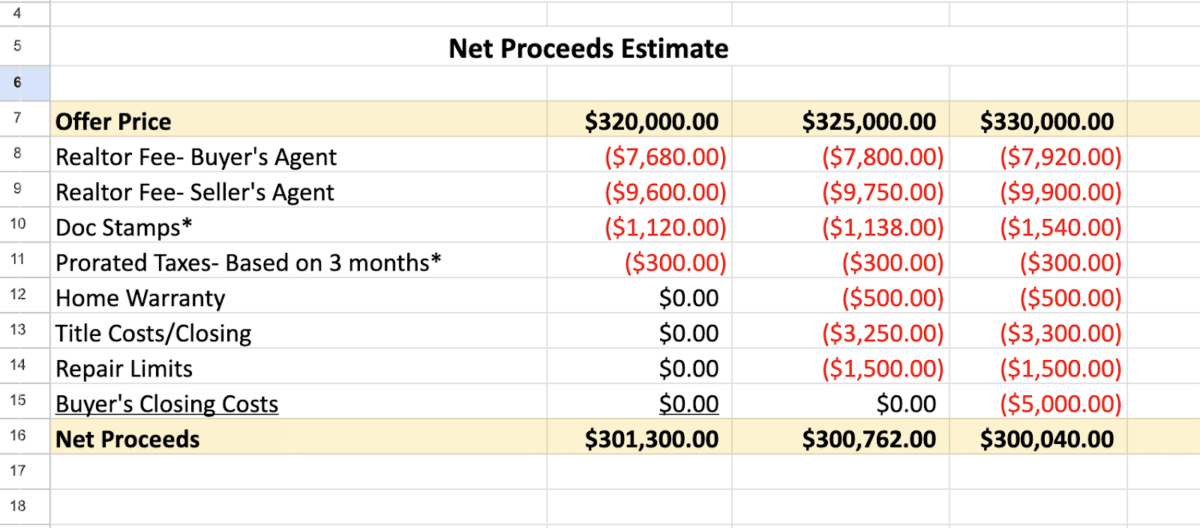Bidding wars can be tricky to navigate, especially if it’s your first time representing a buyer in a competitive situation. I once had a client who wanted to put in an offer on a home with a pool. We scheduled a viewing, which was only a 15-minute slot, before writing up the offer. I contacted the listing agent only to learn that all offers were due by 5:00 p.m. that same day, and she already had 40 offers—forty! But have no fear! I’ve compiled a list of my top tips on how to win a bidding war on a house to help you outsmart your competition and get your clients into their dream homes.
1. Put in a Cash Offer
It may seem obvious, but the first strategy I employ with my clients when I know they’ll face a multiple-offer situation is offering cash if possible. Even if my buyers can’t offer the whole amount, if they have a large slice of the financial pie they can put down, I encourage them to do so. The less your buyers need to finance, the less likely the deal will fall through. So, if your clients recently sold or are in the process of selling a home and have a stash of cash, make sure to put it in the offer.

Example: I had some clients move from another state where they had just sold their previous home. They only had to finance a small part of the home loan (less than $100,000) after they offered to pay 80% of the list price in cash. It worked! My clients beat out the other 10 offers and couldn’t have been happier. They thought I was a genius—which, of course, I am. 😜
2. Offer Above Asking Price
When your buyers are competing with others in a multiple-offer situation, and the listing agent is asking for the “highest and best” offer, it’s a good idea to suggest offering more than the asking price. However, the amount offered should be a serious one. If you were going to make an offer above the listing price, make it more than just an extra $5,000. That’s just 2% on a $250,000 home. By contrast, 10% over asking on a $400,000 home is an additional $40,000. Now, that will stand out to the listing agent and their client.
That may sound like a lot to add, but when your buyers roll it into their mortgage, it should not change their monthly payment so much that it prevents them from qualifying for their loan. If it does, encourage your clients to shop in a slightly lower price bracket. That will make them the big fish in the little pond, giving them a lot more purchasing and negotiating power.
3. Ensure Your Client Has Loan Pre-approval
Many sellers are anxious to get to the closing table quickly, which drives many to cash buyers, even for a lower price. Work with your lender before you submit any offer, and start the loan process for your clients early.
Also, understand the difference between a prequalifying and a pre-approval letter. Many agents use these terms interchangeably, but there is a difference between the two.
- The prequalifying letter: The first step in the loan process. It lets buyers know approximately what they can qualify for to help them determine their budget when they begin home shopping.
- The pre-approval letter: This letter is more robust and reflects how much a lender has conditionally approved. So, the pre-approval carries more weight and can be a deciding factor when every little detail counts in a bidding war.
4. Offer a Sizeable Down Payment
Make a big impression by offering a large earnest money deposit (EMD) to hold the contract. In my area, most people put down around $1,000 to $3,000 for a contract, no matter the home’s value. That’s not including the luxury market—the median sold price in my area in Florida is around $300,000. So, an EMD of $3,000 is less than 1% of the purchase price of a home over $300,000.
One strategy I used to stand out in a real estate bidding war was to offer a much more substantial EMD. If my buyers have the means, I advise them to offer closer to 2% to 3% ($6,000 to $9,000 using the example above) of the purchase price. That showed the sellers that my clients were more invested and serious about purchasing the home.
5. Don’t Ask for Seller Concessions
In many transactions, asking the seller to cover some of the associated home purchasing costs is customary. But every little concession is important when you’re in a bidding war on a house. If you want to beat out the other offers, coach your buyers not to ask for things they don’t need from the sellers.
For example, many agents ask sellers to cover closing costs for their buyer clients. That could be a pretty sizable chunk of money from the seller’s profit. If your buyers can pay for their closing costs, that could put them at the top of the heap. Additional concessions could be:
- Paying for title: This typically ranges from 1% to 2% of the home’s purchase price.
- Repairs: This can cost anywhere from $500 to $2,000, depending on the contract terms.
- Buyer agent commission: This commission can range from 1% to 3% in most cases and may be included in your listing agent commission percentage. However, the buyer’s agent commission is negotiable and doesn’t necessarily need to be paid by the sellers.
6. Find Out the Seller’s Most Important Term
Even though price likely impacts the most significantly, other terms also matter to sellers. When you’ve reached your price limit, try to push your deal to the front by hitting another one of these terms, like the seller’s moving timeline. You can reach out to the listing agent and ask them what the most important term is to their client.

Example: If the seller has a specific closing window to align with another purchase, include that time frame in your contract. That way, you can give them the time to move stress-free. Many times, it’s a small detail that pushes the seller in the right direction.
7. Waive Your Financial Contingency Period
Most buyer clients will use a mortgage to purchase a home. And that’s absolutely fine, but you don’t have to check the contingency box on the contract. If your clients are confident in their ability to qualify for home financing, they can waive those contingencies, which levels the playing field with cash buyers.
Many sellers choose a cash buyer over a mortgage buyer because they want more certainty that the transaction will close. When you remove the possibility of your buyers backing out, you’re giving that seller peace of mind that your clients are in it to win it.
8. Waive the Inspection Contingency
Let me be clear—I am in no way suggesting that your buyers should not do a whole home inspection. In fact, I suggest quite the opposite. Every homebuyer should hire a trained and licensed home inspector on a home they’re about to sink hundreds of thousands of dollars into. I recommend removing the contingency of backing out of the contract after you get the inspection report. That will tell the sellers your buyers are committed to closing instead of haggling over insignificant repairs or canceling the contract. Sellers don’t want to worry if the deal will close once they accept an offer from a buyer.
I know what you’re thinking: “What if the repairs are too much? What if there’s structural damage?” I am not a legal expert, so I cannot advise you. If your buyers waive the inspection contingency but later wish to cancel due to issues discovered during the inspection, there are still ways to terminate the contract, especially if the sellers did not reveal substantial damages. It is essential to note that canceling after the inspection may result in losing the Earnest Money Deposit (EMD).
9. Keep Your Remodeling Plans to Yourself
Part of home shopping fun is standing in a space and figuring out what you could do to make it your own. But don’t let those conversations make their way into the negotiation process. Remember, a home is highly personal to the sellers, and selling a home is an emotional journey.

Example: I recently chatted with my broker about a particular property where she represented the buyers. She also knew how much the sellers had invested in a backyard sanctuary. The sellers were very proud of the gorgeous oasis, an invitation to local wildlife they had created over the years. So, my broker coached her clients, the buyers, to keep their backyard renovations to themselves so as not to spook the sellers from completing the sale. She encouraged the buyers to express fondness for the home, even the parts they intended to renovate. Had the sellers known that the buyers intended to remove all the foliage and install a playground, they may not have gone through with the home sale.
10. Write Up Your Offer on an ‘As-is’ Contract
This strategy is another uncomplicated idea to offer a seller peace of mind. Simply put your clients’ offer in on an “as-is” contract, which lets the sellers know your buyer clients are OK with some flaws. Many agents believe their clients can’t ask for repairs if they submit an offer on an “as-is” contract. But that’s not always the case. There is always room for negotiation when it comes to purchasing a home.

If the sellers accept the contract, hire a home inspector and analyze the report. If something needs to be fixed that makes the buyers feel uneasy about going through with the sale, suggest they ask the sellers to repair it. If they say “no,” your buyers can always cancel the contract and lose their EMD. But if it’s not a huge issue, encourage them to go through with the sale and work on the repairs after they move in.
Buyers often get spooked over repairs that aren’t as serious (or expensive to fix) as they think. Sometimes, they simply need a little reassurance. You should remind them the house is still amazing and that repairs will probably be a part of any resale.
11. Write in an Escalation Clause
I did this with a few of my buyer clients, and it worked about half the time. The way it works is you write in the terms that your clients will offer to pay a specific amount over the highest offer received up to a certain amount. You also need to specify that you need to validate the highest offer received from the listing agent.
You can choose to add this clause to your offer for your clients. They will agree to pay, let’s just say, $5,000 over the highest offer the seller receives. Make sure to include a maximum purchase price based on what your clients are comfortable with. The buyers may sway the sellers to accept the offer if they see this at the end of the contract.
In my state, these became so ubiquitous that Florida Realtors published an addendum to be used with the Florida Realtors Contract. The addendum even includes options for a buyer to pay the escalation clause in cash so it doesn’t go against their pre-approved amount for the mortgage. These escalation clauses can be an effective way to stand out when multiple offers are at play.
12. Offer Rent Back
The possession date is often a point of negotiation in any sale. Sellers, who may try to sell and buy simultaneously, want to close quickly and get their funds but sometimes can’t have their belongings out right away. Consider offering a rent back or lease back for free, or at least a significantly reduced rate, for a few weeks to give the sellers a little breathing room to move out of the home stress-free.
You can also negotiate the closing date with the sellers, giving them the timeline to complete their other transaction. Suppose the sellers can’t close until a certain date. In that case, you might just win the real estate bidding war if you’re the flexible buyer who can accommodate them.
13. Offer to Pay Title Costs
This is a simple thing buyers can offer to pay via a checkbox on the contract. It’s typically left to the sellers to pay the title transfer costs, but if you’re in a competing situation and want to make it as easy as possible for a seller to choose your offer, take this one charge off their plate.
Use this strategy with a couple of additional items on this list for maximum effect. Just ensure your buyers understand what they’re paying for and roughly how much they will pay for these fees. You can quickly check in with the title company to get a breakdown of costs before putting in an offer. Better yet, if you’ve closed other deals at the same price point, you may already have a pretty good idea of what the title companies charge so that you can share your expertise and insights with your buyers immediately.
14. Write an Appeal in Your Offer Email
I no longer tell my buyer clients to write a heartfelt letter to the seller. It can hold up the offer submission, knocking my clients out of contention and putting pressure on them. Not to mention, if I were a listing agent, I would not show letters to my seller clients. Selling a home is already an emotional roller coaster for them, so anything I can do to alleviate added pressure is my job as their agent. So, I don’t show letters to my sellers.
However, I contact the agent directly in the emails I send to the listing agent. I typically do some sleuthing on the sellers and learn a little about them. Then, in the email with the attached offer, I might mention something my clients and the sellers have in common.

Example: I used to work with a lot of military movers, and if I found out that a seller was also military, I would mention my military clients in the email. I didn’t go overboard—I just made a little mention to the listing agent.
This simple tactic has been very effective for me and my brokers. I learned this strategy from them, and I’ve been using it ever since. They’ve been winning more bidding wars when they use this little tip than any letter their buyers wrote ever did.
15. Offer to Accept Repairs Under $1,000
The last thing any seller wants to do is nitpick over minor repairs. One way you can put your buyers in the best position to win a bidding war is to write in the terms that your clients won’t ask for repairs under the $1,000 threshold. Most contracts have built-in repair limits written into the contract already. So, add it into the additional terms if you need to.
Let your buyers know that just because they are taking responsibility for repairing the little things doesn’t mean they’ll be locked into a money pit. Of course, if there’s a major issue on the home inspection report, negotiate with the seller’s agent when the time comes, and they always have the option of canceling the contract.
16. Send a Net Sheet Outlining the Benefits of the Offer
As a real estate professional, you know that the highest bid on a home only sometimes nets the most profit for the seller. But it’s challenging to let the sellers know if your clients’ offer will leave them with a higher return with a contract alone. So, why not show them?

When you get your offer together for your buyer clients, take the extra step and include a fully fleshed-out net sheet that shows the profit the sellers will net with your clients’ offer. This step takes a little extra leg work, and when you’re under the gun for a time, it can seem like a heavy lift. But if you are really competing against several other offers and want your clients to win, this step can make all the difference.
Are the listing agents supposed to do that for their clients? Sure. But do they always do it? Of course not. So, take 30 minutes to sit down and do the math for them. Make it as easy as possible for the sellers to say “yes” to your clients’ offer over the other offers, some of which might be above the asking price.
FAQs
What is a bidding war?
During the real estate craze that was 2021, it seemed like houses were flying off the market as soon as they were listed. It took a lot of work to get an offer from your clients to the listing agents in time to be considered before the sellers accepted an offer from another buyer. That scenario set up the year of the insane bidding wars, where agents constantly had to write up offers on homes for their clients and compete with as many as 30 other offers for the same house.
A bidding war is when multiple offers exist on one home, and agents are forced to represent their buyers in a battle of strategic offer writing. Thankfully, things have calmed a lot since 2021, but because of low inventory, some bidding wars are still ongoing in different markets across the country.
How do real estate bidding wars work?
When a listing goes on the market, there could be a real estate bidding war if the home is of great value and many buyers show interest. When multiple offers are submitted on a home within a short time, typically within 24 to 36 hours of the home going live on the MLS, it could end up in a bidding war. A seller could just end up choosing one of the offers handed in. Or it could end up in a bidding war.
If a bidding war happens, it generally starts with the listing agent returning to all the agents who have submitted offers and letting them know there are multiple offers on the table. The agent then announces that the seller will accept the “highest and best” offers until a specific cutoff time. Everyone who has already submitted an offer has a short time to reconsider, make any additional adjustments to their original offer, and resubmit by the deadline.
How do you handle a bidding war on a house?
The best way to handle a bidding war is first to remain calm. Yes, there is a deadline, but it is usually enough for you to return to your clients and let them know the situation. Sometimes, there is room for negotiation with your buyers, but sometimes, they’ve already given it all they have.
If you have buyers who have lost a few bidding wars already, you might try to persuade them to look at homes under their max loan amount. That would give them more wiggle room to negotiate in a tight market.
What do you do when someone outbids you on a house?
The first thing you want to do is reassure your buyers. Let them know that you will keep an eye on the home if the deal doesn’t close and another opportunity comes but that it’s best to keep moving forward. Tell them a better home is on the horizon. And if something does happen to the home that your buyers didn’t win, ensure you’re alerted as soon as possible. Ensure the listing agent knows your clients are still interested in the home.
But chances are, you’ll find another home they love, and the next time they make an offer, they’ll be open to your negotiation strategies. Sometimes, buyers have to lose a negotiation to “get it.” So, they may not get the first house they fall in love with. But hopefully, they’ll be ready for your bidding war strategies the next time.
What happens if you get multiple offers on your house?
If you’re representing the seller, that’s a great problem to have! If you’re the buyer agent, you could be going to war. The first thing you need to do is prepare your buyers for what’s to come. Help them understand what this means, your winning strategies, and a game plan of what will work best for them. Also prepare them for the possibility they may not win. Go through scenarios to give them an idea of what possible outcomes they can expect.
It may seem overkill to tell them all the potential outcomes, but when your buyers are well-informed, they can make the best decisions. Sometimes, when you coach your buyers in a multiple-offer situation, they opt not to make an offer. But let them know they have nothing to lose from putting in an offer. They just might be the lucky buyers who win.
What is a competitive offer on a house?
In a tight real estate market, a competitive offer includes many of the abovementioned items in the tips. A competitive offer might consist of a large EMD, waived contingencies, an offer with terms that match the sellers’ preferences, and other fees typically associated with the seller covered by the buyers. Anything that can make your buyer clients’ offer more appealing to the seller is considered a competitive offer.
Your Take
Dealing with real estate bidding wars can feel like you’re gambling against the house in Las Vegas. But with a few key tips and strategies, you can level the playing field and help your clients win in these situations. And truthfully, you’ll become a much better agent for having rolled up your sleeves and learned how to negotiate like a pro. The next time you find yourself in a bidding situation, use some or all of the tips in this article to help beat out your competition.
What techniques have you used to help your buyers stand out and win a real estate bidding war? Let me know in the comments if you have a strategy I didn’t mention in this list. Maybe your idea will make the list next time around!












Add comment